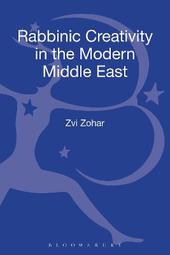
|
Rabbinic Creativity in the Modern Middle East
Hardback
Main Details
| Title |
Rabbinic Creativity in the Modern Middle East
|
| Authors and Contributors |
By (author) Zvi Zohar
|
| Series | The Robert and Arlene Kogod Library of Judaic Studies |
|---|
| Physical Properties |
| Format:Hardback | | Pages:416 | | Dimensions(mm): Height 234,Width 156 |
|
| Category/Genre | Judaism |
|---|
| ISBN/Barcode |
9781441165411
|
| Classifications | Dewey:296.0956 |
|---|
| Audience | | General | | Tertiary Education (US: College) | | Professional & Vocational | |
|---|
|
Publishing Details |
| Publisher |
Bloomsbury Publishing Plc
|
| Imprint |
Bloomsbury Academic USA
|
| Publication Date |
20 June 2013 |
| Publication Country |
United States
|
Description
Rabbinic Creativity in the Modern Middle East provides a window for readers of English around the world into hitherto almost inaccessible halakhic and ideational writings expressing major aspects of the cultural intellectual creativity of Sephardic-Oriental rabbis in modern times. The text has three sections: Iraq, Syria, and Egypt, and each section discusses a range of original sources that reflect and represent the creativity of major rabbinic figures in these countries. The contents of the writings of these Sephardic rabbis challenge many commonly held views regarding Judaism's responses to modern challenges. By bringing an additional, non-Western voice into the intellectual arena, this book enriches the field of contemporary discussions regarding the present and future of Judaism. In addition, it focuses attention on the fact that not only was Judaism a Middle Eastern phenomenon for most of its existence but that also in recent centuries important and interesting aspects of Judaism developed in the Middle East. Both Jews and non-Jews will be enriched and challenged by this non-Eurocentric view of modern Judaic creativity.
Author Biography
Zvi Zohar is Chauncey Stillman Professor of Sephardic Law and Ethics at Bar Ilan University, where he teaches in the Faculty of Law and the Faculty of Jewish Studies. At the Shalom Hartman Institute, Prof. Zohar heads the Alan A. and Loraine Fischer Family Center for Contemporary Halakha. He has published over 60 scholarly articles in Hebrew, English and French, as well as several book-length studies in Hebrew, including: Tradition and Change: Halakhic Responses of Middle Eastern Rabbis to Legal and Technological Change; The Luminous Face of the East - Studies in the Legal and Religious Thought of Sephardic Rabbis of the Middle East; and A Socio-Cultural Drama in Aleppo in the French Mandatory Period. His previous publication with Continuum [written with Avi Sagi] is Transforming Identity, on the history and development of Judaic norms concerning conversion.
ReviewsNo scholar has contributed more to our understanding of Sephardi rabbinical thought in the modern era than has Zvi Zohar, and at last, his wide-ranging study of the legal and religious creativity of Jewish spiritual leaders in Iraq, Syria, and Egypt during the nineteenth and twentieth century has appeared, not merely as a straight translation of his 2001 Hebrew original, but in a reworked and enhanced English version. With erudition and verve, Zohar convincingly shows that there was a very different response which was deeply and authentically rooted within Jewish tradition by Arabic- and Ladino-speaking scholars and communal leaders who were far more open to the modern world than were many of their Ashkenazi counterparts. The Eastern sages, rather than seeing modernity and technology as existential threats to be kept at bay by ever-more stringent regulations and increased communal isolation, saw them as challenges to be engaged calmly and creatively, but at the same time which had great potential for good. Zohar paints insightful portraits of men like Abdallah Somekh, Yitzhak Dayyan, Shaul Abbadi, Elijah Hazan, and Raphael Aharon Ben-Shim?on. He surveys their oeuvre, elucidates their thought, and explains their methodology with clarity and considerable empathy. Rabbinic Creativity in the Modern Middle East is an eloquent and salutary antidote to the all-too-widespread notion that the Judaism's encounter with modernity was an entirely Western phenomenon. The book is a signal contribution to Judaic Studies, Religious Studies and Modern Historical Studies. -- Norman A. Stillman, Schusterman/Josey Professor of Judaic History, University of Oklahoma, USA
|